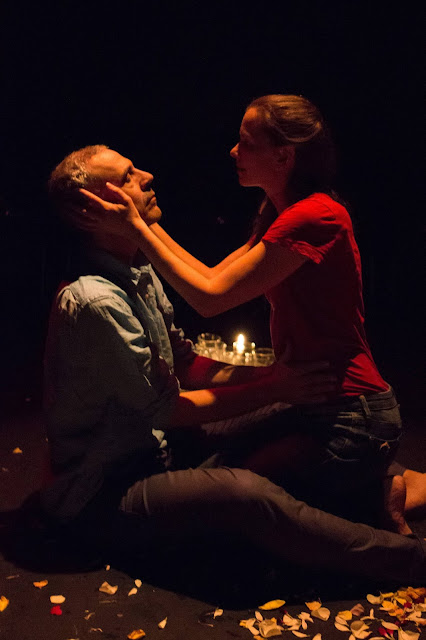LULU V.7 // ASPECTS OF A FEMME FATALE
MAY 1 - 20
photo of Susanna Fournier + ted witzel by Tanja-Tiziana _ design by Lucinda Wallace
Seeing Sky Gilbert in a Santa suit is seasonally unseasonable treat, peppered with distressing, fragmented narratives of the recent horrors of tragic events in the queer community. Gilbert’s character role appearance is a deftly played exercise in his ability to employ. an offhand, causal style that utilizes gestural nuance and fine timing in order to make the father character both appealing and off-putting.
Other equally as complex images and issues arise throughout the current production of Lulu V.7 at Buddies In Bad Times Theatre. As a collaborative work that has utilized the talents of many artists, the seriousness of the issues at hand are assembled with great care and an attention to the details of performance and theatre that fragment and dissect iconic narratives - giving them new contemporary perspectives, and moving them into a kind of epic theatre that gestures toward the past and the present.
Jack the ripper, playwright Frederick Wedekind, santa claus, and an actor in a squid costume (among others) wander through a timeless, non-linear plot line that shows spectators how sex and desire can criss cross in and out of both tragedy and a kind of absurd seriocomic environment. The squid, in particular, is given a standout performance art treatment in an engaging monologue/standup segment by Khadijah Roberts-Abdullah.
Valerie Buhagiar brings a charismatic presence to her multiplicity of roles adding a layered mystery and elegance to each of her appearances - from the glamorous party goer, the bald almost clown-like figure, and the angel-like emissary atop a ladder draped in white where she addresses the audience with absorbing tones and ideas that add to the many punctuating moments of the overall experience.
A long first act diffuses the difficulty of time spent in the theatre with a frequently split focus the involves an array of provocative sights and sounds - from video projections to a combination of read and memorized text, as well as evocative soundscapes throughout. A much shorter second act brings it all together with both grave and lighthearted connecting issues, utilizing elements of feminist and queer theory as a near conversational tool that critiques and analyzes all that has come before - in the play, in the world, and in Toronto.
Lulu V.7 is a fine example of queer theatre as it resists dominant narratives and attempts to give spectators a variety of queer readings on how a quartet of timeless human dilemmas - sex, death, love & grief - can be interpreted and interrogated. Truly a spectacle of radically experimental proportions, with fine performances that might have been a bit more smouldering during last Sunday's matinee performance. It is all about sex after all. Perhaps the evening shows bring out some of the sensual layers that are deeply needed in order to make this engaging drama succeed on every level. Nevertheless, ensemble nudity, stylized narrative choices, and a focus that never depended on a single, simple explanation/resolution, made for a powerful and relevant experience given the times were are currently struggling through.
RUNNING AT BUDDIES IN BAD TIME THEATE UNTIL MAY 20
“Lulu bites into, then tears apart, a classic play about sex and death”
— Globe and Mail
BUDDIES IN BAD TIMES + THE RED LIGHT DISTRICT
A young femme fatale fucks her way across Europe and through a series of lovers who all wind up dead, until she meets her end at the hands of Jack the Ripper. This is LULU. Based on German playwright Frank Wedekind’s 1894 play, this blood-soaked adaptation tears apart a classic text to create a viscerally sexy and energetic treatise on art, sex, and death in the 21st century.
LULU was developed in Buddies Residency Program, sponsored by BMO Financial Group.
e
“A HIGHLY STYLIZED AND EUROPEAN ESTHETIC… ENHANCED BY HEIGHTENED, SELF-AWARE PERFORMANCES FROM THIS IMPRESSIVE CAST”
-Toronto Star (read article)
“IT’S A PROVOCATIVE, IN THE POSITIVE SENSE, CALL AND RESPONSE WITH AN OLD, DEAD, WHITE GUY THAT SHOWS HOW AN OLD PLAY CAN STILL BE THE BASIS FOR A USEFUL AND ARTFUL NIGHT AT A CONTEMPORARY THEATRE, WHICH ALL THEATRES ULTIMATELY ARE.”
-Globe and Mail (read article)
NNNN
“EPIC, EXPERIMENTAL AND CHALLENGING… (AN) AMBITIOUS TOUR DE FORCE”
-Now Magazine (read article)
“SURREAL SCENOGRAPHY, SUBLIME MOVEMENT CHOREOGRAPHY AND IMAGINATIVE COSTUMING COMBINE TO CREATE A WORLD THAT WAS AS VIBRANT AS IT WAS DARK AND FOREBODING.”
-The Reading Salon (read article)
















